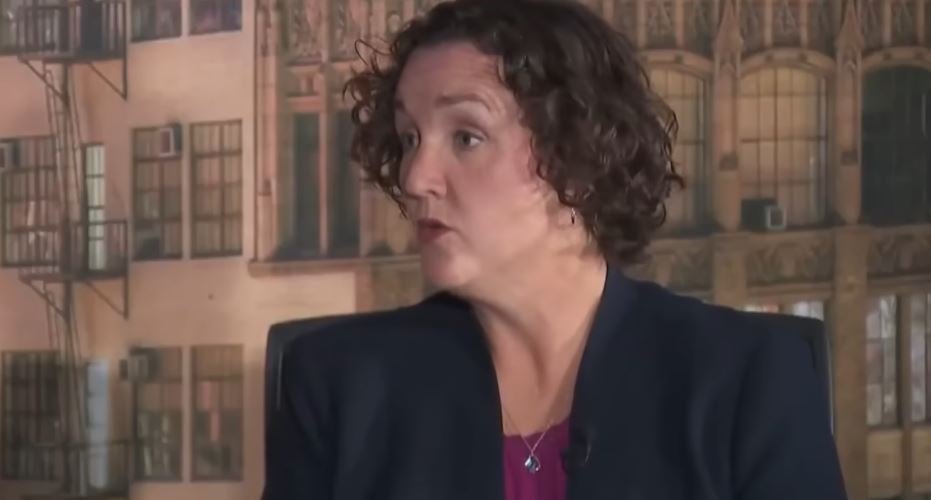
The delicate balance between professional success and personal discipline is reflected in Katie Porter’s estimated net worth, which ranges from $175,000 to $2.1 million. Porter’s wealth reflects a life lived purposefully, based on tenacity rather than privilege, in contrast to many public figures whose wealth appears disconnected from the realities of their constituents. Her academic and political career paths reflect those of someone who values transparency as a practice rather than a catchphrase.
Porter was raised in a home that valued perseverance, hard work, and humility on a small farm in Fort Dodge, Iowa. Her mother co-founded Fons & Porter’s Love of Quilting, a company that turned creativity into a living, while her father switched from farming to banking. Her direct, pragmatic, and remarkably transparent political style was later defined by the lessons learned from her rural upbringing. Porter’s understanding of finance started long before Congress, when she watched her family negotiate the volatile farming economy.
| Category | Details |
|---|---|
| Full Name | Katherine Moore Porter |
| Date of Birth | January 3, 1974 |
| Birthplace | Fort Dodge, Iowa, USA |
| Age (2025) | 51 |
| Nationality | American |
| Education | B.A. in American Studies, Yale University; J.D., Harvard Law School |
| Profession | Politician, Lawyer, Law Professor |
| Political Affiliation | Democratic Party |
| Years Active | 2001 – Present |
| Known For | U.S. Representative for California (2019–2025); consumer protection advocacy |
| Estimated Net Worth (2025) | Between $175,000 and $2.1 Million |
| Main Sources of Income | Congressional salary, teaching career, book royalties |
| Salary as Congresswoman | Approximately $174,000 per year |
| Assets | Home in Irvine, savings accounts, retirement funds |
| Liabilities | Estimated mortgage of $300,000–$600,000 |
| Marital Status | Divorced (Matthew Hoffman, 2003–2013) |
| Children | Three |
Her academic accomplishments were especially noteworthy. She investigated how economics influences human narratives while studying American Studies at Yale. She later studied under Elizabeth Warren at Harvard Law School, who would later serve as her mentor and ideological ally. Porter’s dedication to consumer protection strengthened under Warren’s direction, fusing academic rigor with empathy for low-income families. She entered a legal field that was dominated by corporate interests after graduating magna cum laude in 2001, but she purposefully chose the less-traveled path by promoting justice over profit.
Porter established her reputation as a law professor by taking on financial institutions. She inspired a new generation of lawyers to see bankruptcy as a human crisis rather than a failure while she was a professor at the UC Irvine School of Law. A pivotal moment occurred in 2012 when she was appointed as California’s independent monitor for the $25 billion mortgage settlement by then-Attorney General Kamala Harris. She was tasked with holding big banks accountable, and she was incredibly successful in pressuring them to keep their promises to struggling homeowners. She gained a moral compass in financial reform as well as a legal mind as a result of that experience.
A new chapter in her public service career began in 2018 when she entered politics. Porter, a candidate for California’s 45th congressional district, accomplished what few believed was possible by defeating Mimi Walters, a Republican incumbent who had served two terms, in a historically conservative area. A cultural and political shift toward authenticity in representation was signaled by the victory, which was particularly symbolic.
Porter’s style immediately became noticeable once he was in Congress. Sharp, methodical, and frequently illustrated on her now-famous whiteboard, her questioning during hearings turned oversight into instruction. She made corporate evasion appear incredibly insignificant in comparison to her clarity when she questioned Jamie Dimon about worker wages and pressed Wells Fargo CEO Tim Sloan about his company’s accountability. These were not merely viral videos; they were educational moments that patiently and precisely exposed economic injustice.
Despite being steady, her income is still surprisingly low given her influence. Porter’s income is straightforward, consisting of royalties from her best-selling book I Swear: Politics Is Messier Than My Minivan and an annual congressional salary of approximately $174,000. Her assets, which include a home mortgage, savings, and retirement accounts, are typical of an upper-middle-class professional, according to her financial disclosures. There are no expansive estates or foreign investments, only a life that exemplifies self-control and extremely effective management.
In Washington, where many of her peers have multimillion-dollar portfolios, Porter’s financial story is a stark contrast. Porter’s net worth is still more in line with her constituents’ than that of politicians like Nancy Pelosi or Mitch McConnell, whose wealth reaches tens of millions. Her credibility has increased as a result of this alignment; she discusses debt, housing, and inflation with lived empathy rather than abstract theory.
She has faced challenges in her personal life. After a divorce in 2013, she was left to raise her three children alone while juggling congressional votes and school runs. She has been open about these difficulties, frequently referring to her minivan as her “office and battlefield.” She is especially relatable to working parents who deal with comparable pressures because of these experiences. It’s a tale of tenacity and practicality, demonstrating that political toughness and emotional intelligence can coexist.
Porter declared her intention to run for the Senate in 2023, hoping to replace Dianne Feinstein. Her campaign demonstrated her devoted grassroots support by raising over $1 million in a single day. Even though she ultimately lost the 2024 primary to Adam Schiff and Steve Garvey, her impact remained strong. Determined to turn her reformist fervor into statewide leadership, she instead turned her attention to the 2026 California gubernatorial contest.
Porter’s stance on politics and money has been remarkably constant over her career. She promotes financial transparency as a personal value as well as a policy. Her thorough justifications at hearings have gone viral as civic responsibility lessons. She transforms dry statistics into moral arguments by demythologizing the complex and making economics approachable. Her extraordinarily adaptable communication style inspires citizens who frequently feel alienated by political jargon by bridging the gap between activism and academia.
When compared to her national prominence, her modest net worth becomes a declaration of priorities. It implies that extravagance is not necessary for influence when it is based on integrity. In a political environment that is frequently characterized by excess, Porter’s measured, disciplined, and transparent financial decisions are remarkably resilient.
